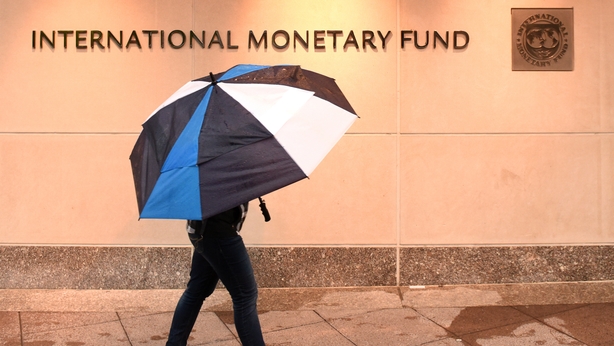The International Monetary Fund slightly lowered its outlook for the global economy, while predicting that most countries will avoid a recession this year despite economic and geopolitical concerns.
The IMF predicted the global economy will grow by 2.8% this year and 3% in 2024, a decline of 0.1 percentage point from its previous forecasts in January.
The forecasts are contained in the IMF's World Economic Outlook published today in Washington, to coincide with the Spring Meetings of the IMF and World Bank.
The IMF says 'the chances of a hard landing’ for economies have ‘risen sharply.’
It says stresses in the financial sector could 'amplify' and ‘contagion could take hold’ which might compel central banks to ‘reconsider their policy paths.’
It believes that growth in advanced economies will slow this year to 1.3% before rising slowly to settle at 3% in five years’ time which would be ‘the lowest medium-term forecast in decades.’
It blames this on the measures that are being taken to bring down inflation, the fallout from problems in the financial sector, the ongoing war in Ukraine and ‘growing geoeconomic fragmentation.’
Irish economy set to grow by 5.6% in 2023
Its forecasts for the Irish economy is for it to grow, in GDP terms, by 5.6% this year and 4% next year. It expects inflation to be an average 5% this year before slowing to 3.2% next year.
Across the euro area, it expects growth of 0.8% this year and 1.4% next year. It expects inflation to average 5.3% in 2023 before slowing to 2.9% next year.
It has pencilled in a decline of 0.1% in Germany’s economy this year before growth picks up to 1.1% next year.
It also forecasts the UK economy will shrink by 0.3% this year before returning to growth of 1% next year.
The American economy is expected to grow by 1.6% in 2023, up 0.2 percentage point on the IMF's previous forecast.
US growth is then predicted to slow to 1.1% next year, up 0.1 percentage point from January.
"The global economy is recovering from the shocks of the last few years, and particularly of course the pandemic, but also the Russian invasion of Ukraine," IMF chief economist Pierre-Olivier Gourinchas said in a press briefing ahead of the release of the IMF's World Economic Outlook (WEO) report.
The leadership of the World Bank and IMF hope to use this year's spring meetings to promote an ambitious reform and fundraising agenda.
But their efforts will likely be overshadowed by concerns among member states over high inflation, rising geopolitical tension, and financial stability.

Advanced economies drag down growth
The overall picture painted by the WEO is a gloomy one, with global growth forecast to slow in both the short and medium terms.
Close to 90% of advanced economies will experience slowing growth this year, while Asia's emerging markets are expected to see a substantial rise in economic output - with India and China predicted to account for half of all growth, IMF managing director Kristalina Georgieva said last week.
Low-income countries, meanwhile, are expected to suffer a double shock from higher borrowing costs due to high interest rates, and a decline in demand for their exports, Georgieva said. This could worsen poverty and hunger.
The IMF expects global inflation to slow to 7% this year, down from 8.7% last year, according to the WEO forecasts.
This figure remains significantly above the two-percent target set by the US Federal Reserve and other central banks around the world, suggesting monetary policymakers have a long way to go before inflation is brought back under control.
The IMF's baseline forecasts assume that the financial instability sparked by the collapse of Silicon Valley Bank last month has been broadly contained by the "forceful actions" of regulators on both sides of the Atlantic, Gourinchas told reporters.
But he added that central banks and policymakers have an important role to play to buttress financial stability going forward.

Germany on the brink of recession
While the picture is one of slowing growth, almost all advanced economies are still expected to avoid a recession this year and next.
Alongside growth in the US, the Euro area is also forecast to grow by 0.8% this year, and 1.4% next year.
However, its biggest economy, Germany, is now expected to contract by 0.1% this year, joining the UK as the only G7 economy expected to enter recession this year.
The picture is more positive among emerging market economies, with China forecast to grow by 5.2% this year.
But its economic growth is predicted to slow to 4.5% in 2024, as the impact of its reopening from the Covid-19 pandemic fades.
And Russia is now expected to grow by 0.7% this year, up 0.3 percentage point on January's forecast, despite its invasion of Ukraine.
Poor productivity weighs on medium-term outlook
Looking forward, the IMF forecasts that global growth will fall to 3% in 2028, its lowest medium-term forecast since the 1990.
Slowing population growth and the end of the era of economic catch-up by several countries including China and South Korea are a large part of the expected slowdown, as are concerns about low productivity in many countries, according to Daniel Leigh, who heads the World Economic Studies division in the IMF's Research Department.
"A lot of the low hanging fruit was picked," he told reporters ahead of the publication of the World Economic Outlook.
"On top of that now, with the geopolitical tensions and fragmentation, this is going to also weigh on growth," he said.
Financial stability risks have risen 'significantly'
Meanwhile, a key report on the world's financial system by the International Monetary Fund (IMF) has found that financial stability risks have risen 'significantly’.
The Global Financial Stability Report published today in Washington, says the failures of Silicon Valley Bank and Signature Bank in the US as well as the ‘loss of market confidence’ in Credit Suisse highlight ‘the challenges posed by the interaction between tighter monetary and financial conditions and the buildup in vulnerabilities.’
It also comments that the result of what happened in financial markets in recent weeks led to a massive repricing of where markets believe interest rates are headed. It says this shift was comparable in magnitude and scale to Black Monday in 1987.
It questions whether or not these recent incidents are the ‘canary in the coal mine’ after a decade of low interest rates or just isolated cases.
The report says investors have now priced in a lowering of interest rates even while inflation ‘has remained uncomfortably above target.’
Additional reporting by Robert Shortt

